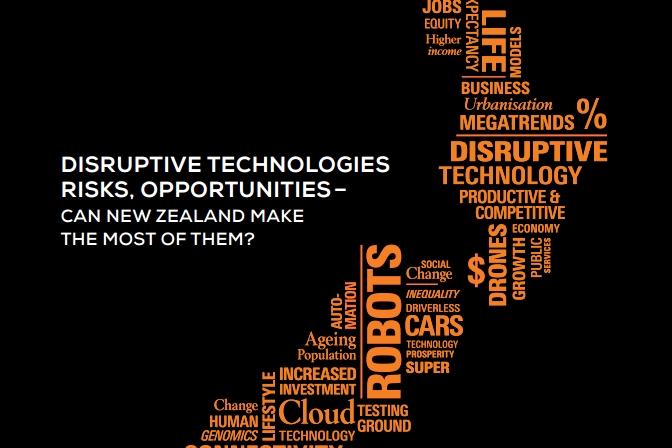Published on the 23/10/2015 | Written by Donovan Jackson

Half of all jobs in New Zealand are ‘at risk’ of being automated over the next two decades, with rural New Zealand being hit the hardest…
That’s the frightening framing of a finding of a new research paper, Disruptive Technologies: Risks, opportunities – can New Zealand make the most of them?
The paper was produced by Chartered Accountants Australia and New Zealand (CAANZ) and the New Zealand Institute of Economic Research (NZIER).
Writing in the introduction, CAANZ president Fred Hutchings noted, “There is a growing impetus for New Zealand businesses to adapt to minimise the disruptive effects of technology. Current business models won’t be sustainable, and the need for change is becoming urgent.”
CAANZ chief executive Lee White said the research confirmed the need to embrace technological change or risk being left behind. “It shows that 50 percent of all jobs in New Zealand could be at risk of computerisation and automation, and that disruptive technologies will have the most negative impact on labouring jobs.”
The choice of ’employment risk’ to describe the impact of automation is interesting. Since the time of Adam Smith, automation has been feared as a cause of unemployment; the Luddites in the early 19th century went as far as to destroy the machines they saw as competition, and in his 1964 essay ‘The Curse of Machinery’, economist Henry Hazlitt wrote, “Among the most viable of all economic delusions is the belief that machines on net balance create unemployment. Destroyed a thousand times, it has risen a thousand times out of its own ashes as hardy and vigorous as ever.”
Closer to home, Hawkes Bay engineer Bob Stokes remarked in a recent iStart feature that, “The reality is that with automation, jobs don’t disappear, they change.”
CAANZ and NZIER said that around 75 percent of labouring jobs have a ‘high risk’ of automation and around 12 percent of professional positions will be lost. In raw figures, the report puts the number at 885,000 jobs which might disappear. “So far automation has impacted blue-collared employment most; however, the coming wave of innovation threatens to upend white collar work as well,” White noted.
The paper illustrated that regional New Zealand would be worst hit, with Canterbury at the ‘highest risk of job losses’ due to automation, followed by Waikato, Manawatu and Otago.
The impacts will also be felt in the balance of the sexes: “The categories most at risk of automation include manufacturing, mining and trades which tend to be male-dominated.
“New Zealand has traditionally had a male-dominated society. This could change as a result of disruptive technologies.”
However, despite the dramatic headlines from CAANZ, it’s not all bad news; “We are a nation of enthusiastic adopters. We embrace technological change and its associated benefits. But any rapid change brings associated trade-offs and risks as well as benefits. It is these trade-offs and risks that must be subject to transparent public debate.”
White said New Zealand was well placed to take advantage of emerging technologies; “In order for New Zealand to reap the opportunities presented by emerging technologies, businesses will need to be innovative and collaborative.”
The report is available to download here: Disruptive Technologies: Risks, opportunities – can New Zealand make the most of them?




























You “re-frame” the report in challenging words, but add little to it, so it stays on as a challenged PR piece.
The difference to the 19th century is that book selling, Newspapers, Magazines, Printing and Travel already have been automated with 10% of jobs left, retail, commercial office space is in the middle of it and it will affect most other industries sooner or later. Yes, its got to be discussed, but it seems much more likely than in teh 19th century for automation to take people’s jobs.
We need to figure out how to engage all these people who have been taught that they are worthless without a job to have meaning in their lives without one.
Jochen
Hi Jochen
Thanks for the comment. Automation does ‘take people’s jobs’, because those jobs are often not really that much fun anyway, and when the jobs are taken, it leaves people free to do more interesting things. Automation has always delivered benefits to humanity, in the form of lower cost products and services for all of the rest of us. While we are all familiar with the concept of making whatever we provide (skills or products) scarce, but want whatever we procure to be plentiful (so costs are high, and low, respectively), the world is bigger than the individual, or group of individuals, who/which might be displaced. Automation drives efficiency; efficiency creates volume, volume drives price down.
This doesn’t make people worthless, it is done for the benefit of people (the customers who buy goods). We see it around us every day – it wasn’t all that long ago that the technological marvel of a computer or a cellphone was the preserve of the very rich.
And of we look at employment levels in NZ in this wondrous technological age, it seems to have held out pretty well. The worst on record was 1992, with unemployment at 10.2 percent. It has since improved, despite the advances made in automation over 23 years, to 5.8 percent. Indeed, we still have to import workers from the Islands to harvest kiwifruit and perform other tasks, so it is difficult to see how automation is a bad thing.
Best regards
D